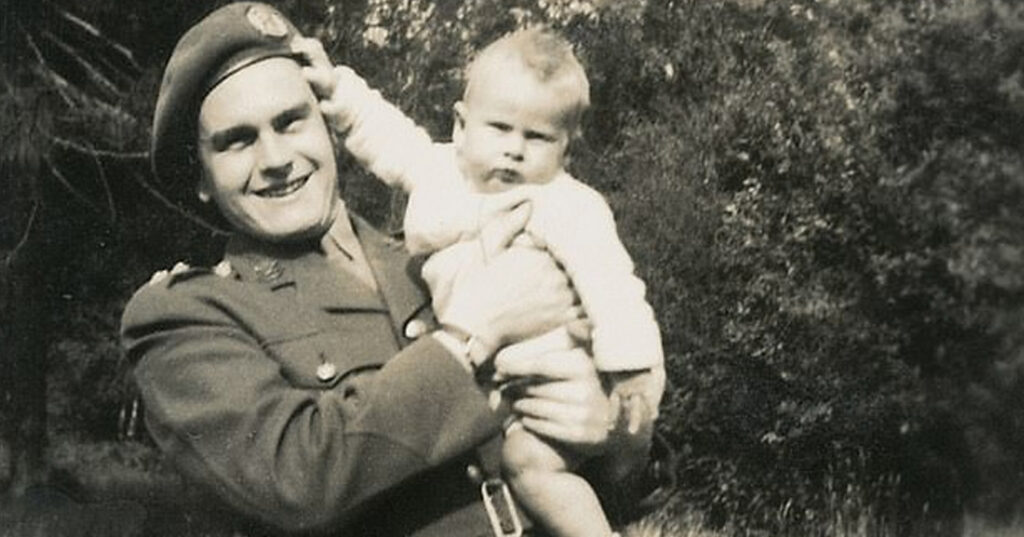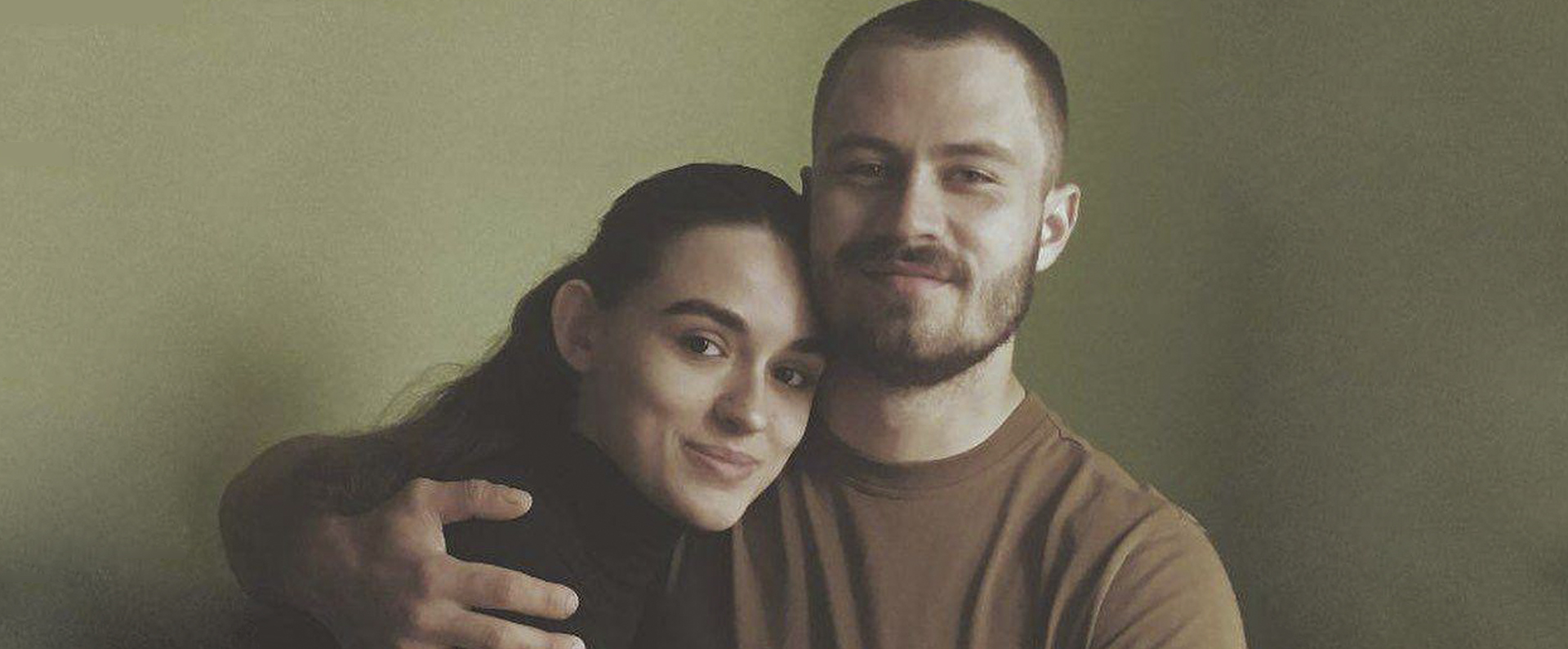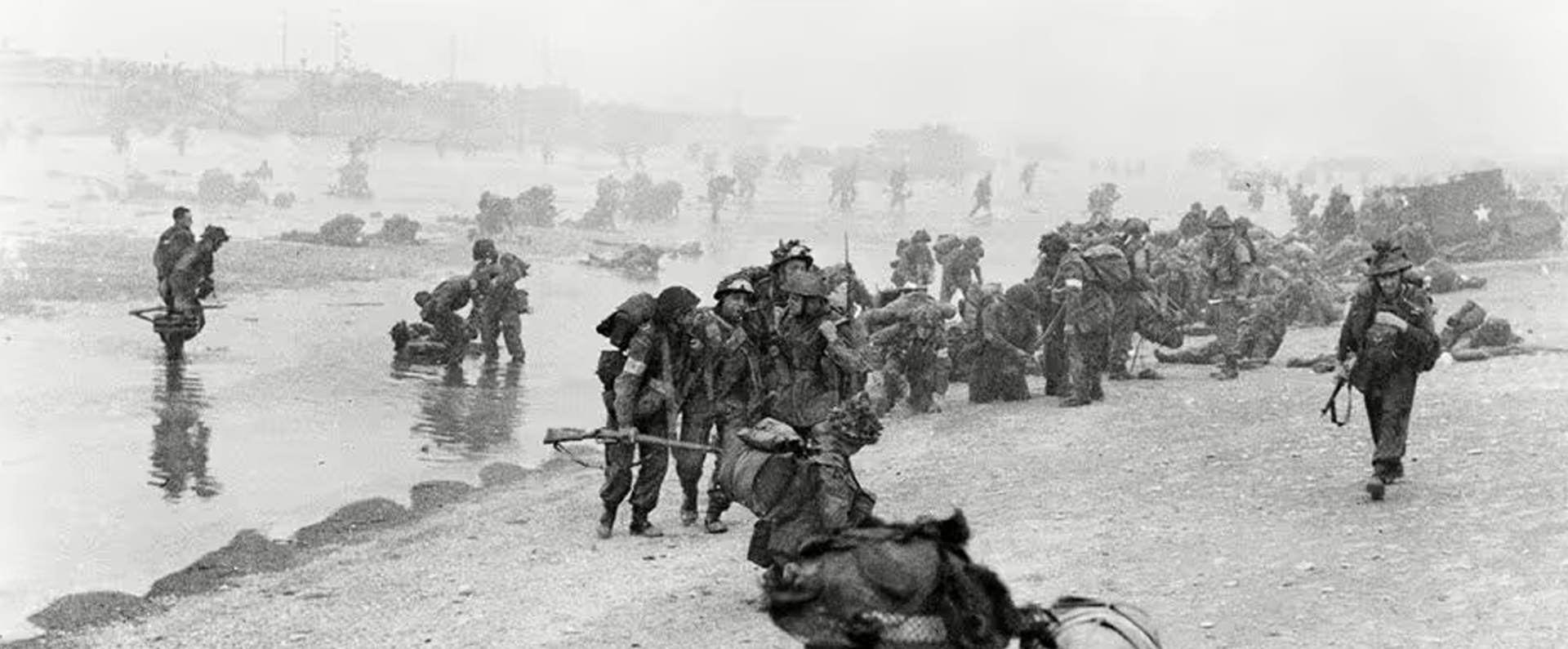
Published in the Mail on Sunday on 26 May 2019.
Lieutenant-Colonel Richard Burbury
Lieutenant Eric Ashcroft
Lord Ashcroft on the newly discovered family papers that reveal the mesmerising story of the colonel that led his father into battle.
It was dawn on Tuesday, June 6, 1944. In a landing craft filled with a sense of fear and trepidation, two officers from very different backgrounds crouched low to avoid the inevitable incoming fire. In an earlier confidential briefing, the men had been warned to expect 75 per cent casualties – dead and wounded – as they charged up Sword Beach as part of the D-Day landings.
They had, understandably, kept that grim prediction from the rank-and-file as they prepared for their role in the largest seaborne invasion in history: codenamed Operation Neptune, it involved more than 155,000 men.
One of those two men was the privately educated Lieutenant-Colonel Richard Burbury, 38, commanding officer of the 1st Battalion, South Lancashire Regiment; the other was a working-class ‘Lancashire lad’, Lieutenant Eric Ashcroft, a 27-year-old signals officer. The latter was also my beloved father.
As they crashed through the waves and ran on to Sword Beach, the 1st South Lancs came under withering enemy fire.
Lieut-Col Burbury was shot dead by a sniper’s bullet and my father suffered serious shrapnel injuries.
Such are the fine margins between life and death on the battlefield. If my father had been standing just a few feet to one side, he would have been killed and Lieut-Col Burbury might have lived.
My father fought on until he was ordered from the battlefield, and he went on to make a full recovery.
Later, he would marry, have two children and enjoy a fulfilling career as a colonial officer before eventually dying in February 2002, a month before his 85th birthday.
My father would recount his terrifying experiences to me when I was a boy of about ten, and it was this that first inspired my lifelong interest in bravery – one that would lead me to amass the world’s largest collection of Victoria Crosses (more than 200 to date) and to write six books on gallantry.
Throughout my adult life, I had always wanted to learn more about Lieut-Col Burbury, but aside from his name, rank, age and the date of his death, the details of his life were unknown to me – until now.
For in a strange coincidence, I discovered that Eton College put out an appeal several months ago asking the families of Old Etonians involved in D-Day to come forward with information for a school project to mark the 75th anniversary of the landings.
Sarah Warren and Emily Houghton, the school librarians, and the inspiration behind the project, were understandably delighted when they were sent a fascinating archive on the life and career of one Lieut-Col Burbury. It turned out that, in another coincidence, Sarah Warren had collaborated closely with Andy Saunders, a respected military historian with whom I have worked – and who was aware of my interest in Lieut-Col Burbury. After gaining the family’s consent, Eton kindly allowed me to access the archive to tell the full story of his remarkable life – and death – for the first time…
RICHARD Percival Hawksley Burbury was born in Barnsley, South Yorkshire, on April 1, 1906. He had a twin sister, Patience, and three older brothers.
The five children were initially brought up in the town on the west bank of the River Dearne.
Richard’s father, Francis, was himself an experienced soldier. He had served as an officer in the Queen’s Own (Royal West Kent Regiment) before retiring from the Army to run a successful firm of linen manufacturers, then subsequently resuming military service for the Great War.
Francis Burbury and his wife Ethel both died in 1919. Francis died on active duty in India; his wife probably died from Spanish flu (between 1918 and 1920, the pandemic claimed some 50 million lives worldwide, thereby making it one of the deadliest illnesses in human history).
The five orphaned children were then cared for by their aunt, Ethel’s sister, who had two sons of her own. However, money was clearly plentiful as they were educated privately. Richard attended Ludgrove School and, later, Eton College, leaving in 1923 at the age of 17, destined for a military career.
Following officer training, he was commissioned as a second lieutenant into the Duke of Cornwall’s Light Infantry, serving for a time in India. Already a promising soldier, he was sent to Palestine in 1938, a year before the outbreak of the Second World War, and was mentioned in dispatches.
ON his return from the Middle East, he married Daphne Macnaghten, an Army officer’s daughter from Camberley, Surrey, in March 1940.
Burbury served in France in 1940 and was evacuated from Dunkirk. Again, he was mentioned in dispatches. A confidential report from a senior officer dated August 14, 1941, in which Burbury is assessed for promotion, describes him as having ‘sound technical knowledge, good judgment and considerable personality, initiative and determination. I consider him in all fitted to command a battalion’.
Burbury was indeed marked out for senior command for, having been promoted to substantive major in September 1942, he was seconded, in the rank of lieutenant-colonel, to take command of the 1st South Lancs.
Such advancement no doubt reflected his valuable services in Palestine and with the British Expeditionary Force in France in 1940 and, equally so, his leadership qualities.
Among his equipment, when he took part in the D-Day landings, were silk maps of France and Germany – clearly supposing that the Nazi army would soon be on the retreat to its homeland.
I am fortunate that, many years after leaving the Army, my father gave a tape-recorded interview to the Imperial War Museum sound archive in which he described, with a typically wicked sense of humour, the atmosphere in the landing craft as the assault force crossed the choppy English Channel.
‘The chaps that were sick, their vomit bags were pushed over the side. And one chap was signalling frantically, you know, “Don’t throw the bag over!” Apparently his [false] teeth were in the bag.
‘And that seemed to break the tension of things: this chap wasn’t worried about landing on the beaches; it was more that his teeth were in the bag.’
Once ashore, Burbury shouted encouragement to his men as they raced up the beach.
Captain Arthur Rouse, of the 1st South Lancs, was also interviewed by the museum and he takes up the story: ‘Colonel Burbury headed for the sand dunes. There was a slight gap to his left, and his gaunt figure strode across the sand towards this gap in the sand dunes. I followed him and one or two people started to fall as mortar fire and machine-gun fire came across and [there was] fixed artillery firing along the line of the beach.
‘I said, “Keep going, they’ll be looked after.” We didn’t want people trying to help their friends.
‘Eventually we all assembled in the lee of these sand dunes, the commanding officer and me looking over. And he just turned to me with his map in his hand and said, “Where are we, Arthur?” and then he was shot, immediately.
‘His jaw went into spasms and he dropped down.
‘The colonel was such an obvious target: he had a flag in his hand in case there was going to be confusion and he could be rallied round, he waved his map as well. I think he was hit by a sniper.’
My father, who had seen Lieut-Col Burbury get shot in his chest, also recounted: ‘About two-thirds to the high-water mark I was knocked sideways when, so it would appear now, an 88-millimetre splinter [a splinter from an 88mm shell] struck my right arm. I was moving across the beach at the time fairly fast and I didn’t think anything of it. I just kept moving.’
My father added: ‘I remember, when we were in the sand dunes, I was looking down and saw a procession of ants and thought, “Goodness me, they’re not affected by the war.” The silly thoughts you get.’
JUNE 6, 1944 marked the end of both Burbury’s life and my father’s war on the front line. General Sir Douglas Baird, Colonel of the South Lancs, wrote to Burbury’s twin sister Patience on June 22, 1944, saying: ‘Please accept my deepest sympathy at your great loss. Your brother was a magnificent soldier.’
In his museum interview, my father recalled the aftermath of the hand-to-hand fighting: ‘I was sent back to the field-dressing station and it was at that stage that I saw many of the wounded in the beach area.
‘I saw officers that had been blinded, walking wounded, stretcher cases, and all the documentation was going on. Labels, tags.
‘Ones that were given morphine had lipstick put on their foreheads, I seem to remember: a capital M.’
In fact, although there were many dead and wounded on, and close, to the five Normandy beaches chosen for the invasion, casualties were smaller than feared.
On D-Day itself, Allied casualties were just over 10,000, with 4,414 confirmed dead.
Eventually, my father was evacuated to Britain on a hospital ship. Indeed, it was during his recuperation that he met my mother, who, incidentally, died earlier this year, aged 97.
The archive on Richard Burbury belongs to Will Stirling, himself an Old Etonian and the godson of Patience Burbury. Patience never married and eventually lived into her 90s.
The death of her twin was a second terrible loss for the family as the eldest of the boys, Jack, had already been killed in the First World War.
Jack, also an Old Etonian, was killed, aged 19, at the Second Battle of Ypres in Belgium in 1915.
Contained in the Burbury family archive is a moving letter from the front line in which their father (who was also fighting on the Western Front) describes Jack’s death. ‘He was hit by a bit of a shell in the head, and though he lived 12 hours was never conscious, thank God,’ he wrote.
‘I, who am on a railway staff job, and was about ten miles away, borrowed a car and ran over as soon as I heard, but did not see him alive, which I do not regret.
‘I saw him, and his face was the face of an angel, and I would rather remember him so.’
ETon College may be a bastion of wealth and privilege but there is no doubt that Old Etonians have performed magnificently on the battlefield for centuries.
No fewer than 37 Old Etonians have been awarded the VC in conflicts spanning from the Crimean War to the Falklands War (Colonel ‘H’ Jones – who died liberating those islands – attended Eton before joining the Army and embarking on officer training at Sandhurst).
At least 17 Old Etonians were killed during Operation Neptune, the first phase of Operation Overlord aimed at capturing Normandy before, eventually, pushing on deeper into German- occupied Europe.
Five years ago, ahead of the 70th anniversary of D-Day, I visited Sword Beach to see for myself where my father had landed and where his CO had fallen.
I visited Hermanville Cemetery in Normandy in order to pay my respects at Burbury’s grave. As I looked at his gravestone, I noticed that, etched in the white Portland stone, the date of his death was given as June 7, 1944.
As a stickler for detail, I decided to get this corrected: after all, he died on D-Day, one of the most significant dates in world history, not a day later.
After providing proof of his date of death, I am glad to say that the Commonwealth War Graves Commission eventually agreed to correct the date on his gravestone.
So, given my great interest in Burbury’s life, you can imagine my joy – just days ago – at being given access to his archive: photographs, letters, Army documents, certificates, maps, his regimental lapel badge, school books and much more.
Incredibly, the archive also included photographs of the original grave marker showing the date of Burbury’s death as ‘6.6.44’.
Today I feel a sense of closure that I have finally learnt so much more about my father’s courageous CO. And I feel privileged that, through this article, I have been able to pay a public tribute to the man who fell at my father’s side on D-Day 75 years ago.
Perhaps the best tribute to Burbury was the one paid publicly to him by his regiment after his death: ‘To meet him was to at once be impressed with his strong personality and soldierly bearing. He was a born commander and a regular officer of the very best type…
‘In the manner of his passing, he has inscribed his name in the hearts of the men who admired and loved him and who saw him fall in the thick of the fight.’
Read this article on www.DailyMail.co.uk
For more information, visit:
LordAshcroftOnBravery.com


